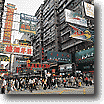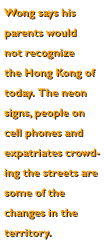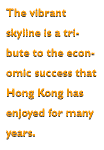

Photos by Eric Gran



Berkeley journalism student reports on the colony's transition
through an emotional journey to his parents' homeland.
by Edward Wong
I learned to tread lightly on gravesites in Hong Kong. For in this most modern and traditional of Chinese societies, there were spirits that had to be fed, nurtured, and humored. Graves were swept regularly. A pile of ashes at the foot of tombstones indicated where paper money had been burnt. Sometimes the offerings took the form of snacks left on plates or yellow incense sticks protruding from vases, strings of fragrant smoke still curling into the air.
I clutched the bundle of flowers and followed my cousin Eugene and Aunt Wan Heung up a steep flight of stairs. The cemetery was designed in a traditional Chinese style: thousands of gravestones on a hillside overlooking the harbor, the lush Kowloon hills and ships from far corners of the world in the distance. The graves were divided along terraces and faced the water, conforming with geomantic laws of feng shui to placate the spirits.
If I believed in those things, I would have thought my grandfather Wong Tak Yuen's ghost drifted in perpetual loneliness. His two sons and close relatives had all moved to the
United States after his death in 1964. His wife was buried half a world away in a suburb of Washington, D.C. No one visited his grave except on the Qing Ming festival, when my father sent money to a distant cousin to bring flowers here.
But long before I left the U.S., I knew there were certain rituals I would have to perform. I would find the burial site of this man whom I had never known, dying as he did six years before my parents met. I would place flowers on his grave and bow my head three times in honor of him. And I would brush away the cobwebs that laced his headstone, hoping through these acts he would see that his family hadn't forgotten him, that some part of his life in Hong Kong had returned to him despite all the years.
I came to Hong Kong for the first time as a journalist covering the most long-awaited event in the colony's history; as an American-born Chinese just awakening to the possibilities of his ancestral culture; and as the son of parents who, having grown up here, left their families and friends, never to return.
It was June 1997 and history, as they say, was in the making. In one month, the territory would return to China after 156 years of British rule. But nothing in the surroundings betrayed this epochal change. The city appeared, on the surface, to be suffering through another Hong Kong summer: the air thick with the sweat of the tropics, the streets bustling with people always short on time. Only occasionally did the city's relentless motion seem to hesitate, allowing me a glimpse of a society breathless with expectation.
This was the scene that awaited me when I arrived with nine other students from UC Berkeley's Graduate School of Journalism. Our reporting trip was funded by private foundations with their own interests in Hong Kong's future. Most of us had freelance assignments with U.S. newspapers. We were to write on what we saw and heard, the people we met, the word on the street.
The school had arranged meetings with politicians, business people, dissidents, labor leaders, and professors, among others - an apparent cross-section of Hong Kong society. But I soon found that my most intimate contacts with the city came from family and friends I had only heard about from my parents.
Since 1971, when they settled near Washington, D.C., neither of my parents had returned to Hong Kong-their commitment to jobs and children left little time or money for a journey half way around the world. If my parents returned, they would recognize little of their native city. A subway shot beneath the water, linking island and mainland. People streamed through the streets talking on cell phones. Apartments where my father once lived no longer existed. In their place were new ones, higher ones. A sprawling Japanese department store stood on the site of his old primary school. My father remembered Hong Kong as a quiet place: the silence of the streets after sunset, the soft clatter of the wooden tram at night.
As for my mother, she recalled most clearly a promise made to her closest friends before she left. "I told them I would come back in one year, that I would see them all again," she told me one night last year. "But we didn't know things would be so hard when we moved here. Now it's been 25 years, and I still haven't kept my promise."
From his apartment in the hills overlooking Wan Chai district, Eugene Mahr pointed out the hospital where his mother once worked as an interpreter and clerk.
But my cousin was no native to the city. Like me, he had been born in one of the world's countless Chinatowns. The streets of the Bronx were more familiar to him than the crowded avenues of Tsim Sha Tsui. So were the halls of Brown and Yale universities, where he earned his bachelor's and MBA degrees. He spoke accentless English, but betrayed his foreign roots when slipping into Cantonese.
Although my parents and Eugene's mother had emigrated to the U.S. to find their fortunes, the next generation was coming back with titles unknown in earlier times: marketing director, sales rep, branch executive. Eugene was regional marketing manager for Polaroid, which meant travel to cities like Beijing, Shanghai, and Shenzhen.
"I wanted an overseas assignment," Eugene told me. "At one point, I was saying I'd go to Europe. But the natural fit for people like myself is Asia. There are a lot more opportunities in Asia, a lot more demand for expatriates here."
The expatriate life had been kind to Eugene, as it had for the tens of thousands of foreign workers thriving in Hong Kong's capitalist glow. He lived with his family in a 2,000-square-foot apartment-large by Hong Kong standards. He earned a six-figure salary with housing, car, and maid allowance. His wife worked for Bank of Australia. The company paid for their sons to attend one of the city's top international schools.
For expats like them, the handover meant deciding which ball to attend and finding the ideal vantage point to see the fireworks. After all, they had the one thing that many Hong Kongers desired - a foreign passport. They also had their companies and a one-way ticket back to the U.S. after two or three years.
Yeung Chi was telling me over a meal of dim sum how she hadn't seen her sister in 10 years. At age 83, Chi faced the very real
possibility of never seeing her again. For her sister, Yeung Sheung Fung, my only surviving grandparent, had moved to San Francisco to live out her remaining years in the care of her children. My grandmother would turn 90 this year, the events of her years in Guangdong, Hong Kong, and northern California drifting in haphazard directions.
"She always looked after me when we were younger," Chi said. "Has she mentioned me to you?"
Although I didn't recall my grandmother ever mentioning Chi, I said yes, of course, I knew all about her and her family.
Chi, her three children, and their families had invited me to this Kowloon restaurant to meet them for the first time. Waiters wheeled carts stacked with steaming dumplings, rice porridge, and noodles. Chi's eldest daughter, Nancy Leung, sat next to me and, between questions about my parents' lives in America, urged me to eat more.
She reminded me of my mother in many ways. Both were lively women in their early 50s, never lacking for conversation, always wanting to know more about family and friends. But Nancy had never had the opportunity to leave Hong Kong. For much of her adult life she had lived only a short walk from the restaurant in crowded Mongkok, a neighborhood said to be the most densely populated on earth. Unlike Eugene's flat, its views were limited to tenements across the street. The living room could just hold a television, coffee table, and couch.
Nancy's husband had recently retired from his job as a factory worker. Neither of them held foreign passports; nor did their children. With the handover around the corner, they had few options.
"I don't think much will happen," Nancy said. "Our lives will go on as they did before."
Her sentiment was echoed by most of the people I met during my month in Hong Kong. Nancy seemed more concerned about why my mother hadn't returned to see them since moving to the U.S. They had grown up together, but now led vastly different lives on opposite ends of the world. As we finished lunch I promised everyone that my parents would soon visit, maybe as early as next year. But looking back, I realized my vow must have been similar to the one my mother made to them with all sincerity 25 years ago.
It is early on June 30 in California, already 10:45 p.m. in the time zone that encompasses eastern China, from the empty plains of Manchuria to the Hong Kong metropolis. On the other side of the Pacific, my mother, my sister, and I gathered around the TV. They had flown into San Francisco to visit family for a week. And so it happened that my mother would find herself that much closer to the city of her youth during its return to the motherland.
On "Good Morning America," Peter Jennings, sitting before a Hong Kong backdrop ablaze with neon, talked of a "great sense of ethnic pride" throughout the world. The show cut to scenes of Vancouver's Chinatown, where, Jennings said, half the 300,000 Hong Kongers who had settled there had returned to their native city, but with Canadian passports. Somehow, they had managed to swallow their "ethnic pride" and don the mantle of a new nationalism.
That evening, I stood in my aunt Ivy's kitchen in San Francisco's Sunset District and watched as my mother and her two younger sisters prepared dinner. While my mother had settled on the East Coast, Amy and Ivy had ended up in this city of rolling fog, white houses, and a sweep- ing bay not unlike the harbor of their childhood. Separated most of their adult lives, they found themselves, on the day of Hong Kong's reunion with China, cooking together and sharing a meal as they had when they lived in a quiet Hong Kong neighborhood.
"It's hard to believe that '97 has arrived," said Amy, youngest of the three. "It's come so soon. It hasn't even been 10 years since we left."
Of the three, Amy was the most recent émigré and had had the most difficult adjustment to American life. She, her husband Steven, and son David had moved to Daly City in 1987 out of fear of the Communist takeover. Their parents had seen their lands stripped away, friends turn on them, and family killed during Chairman Mao's years of revolution.
But in the U.S., they hadn't found the haven they had hoped for. They faced instead the downside of immigration - the sense of non-belonging, of displacement from people and culture, of feeling like "second-class citizens." Steven, who worked for a Chinese shipping company in San Bruno, earned less money here. Their son David remained attached to Hong Kong culture: going to karaoke bars, watching Chinese TV and movies, surrounding himself with Asian friends. In fact, he wanted to find work in Hong Kong after graduating from UC Davis, quite willing to sacrifice U.S. citizenship for allegiance to his birthplace.
Now, the singular event which had caused such upheaval in their lives had passed. As Steven stood in the kitchen frying a pan of vegetables, I asked him how he felt about it.
"As for myself, I don't feel much of anything," he said. "If it weren't for the handover, I wouldn't have come here. I don't belong to Communist China, Taiwan, or the U.S. I'm just a Hong Kong citizen. And now, Hong Kong no longer exists."
Whether Hong Kong had ever existed in any permanent sense seemed doubtful to me. For so many Chinese, it had existed as an idea - a haven from the mainland's political turmoil, a land of potential riches,
fertile ground for a new life. So many people like my family had passed through before moving, however reluctantly, to a new destination. There were those who returned, some whose children came back, and others who would never again have ties to the territory. Many Chinese knew it now as the world's largest way station. But my grandparents couldn't
have envisioned the day when their children would
be scattered across the globe, separated from the comforts of family and
a native culture. ![]()
[Table of Contents] [Berkeley Magazine Home] [UC Berkeley Home]
Please e-mail your comments to ucbwww@pa.urel.berkeley.edu